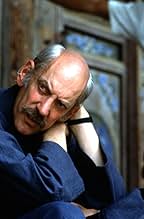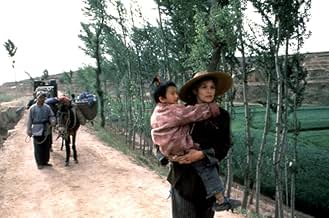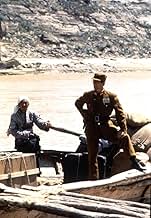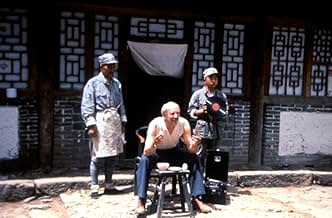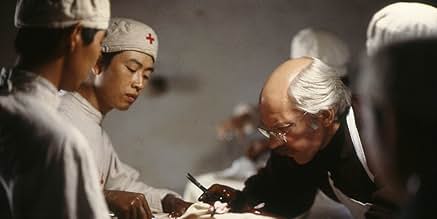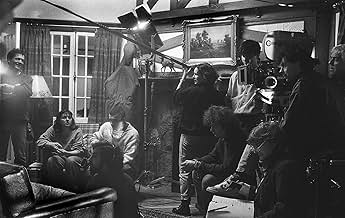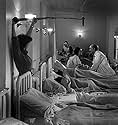IMDb RATING
6.4/10
438
YOUR RATING
Canadian doctor Norman Bethune joins Mao's army in China, setting up field hospitals and training medics. Flashbacks show his early life, socialist beliefs, medical innovations, humanitarian... Read allCanadian doctor Norman Bethune joins Mao's army in China, setting up field hospitals and training medics. Flashbacks show his early life, socialist beliefs, medical innovations, humanitarian work in Spain, and marital struggles.Canadian doctor Norman Bethune joins Mao's army in China, setting up field hospitals and training medics. Flashbacks show his early life, socialist beliefs, medical innovations, humanitarian work in Spain, and marital struggles.
- Awards
- 1 win & 9 nominations total
Linian Liu
- Dr. Fong
- (as Harrison Liu)
Zong-yao Tan
- General Nieh
- (as Tan Zong Yao)
Ke-Yaw Zhang
- Chairman Mao
- (as Zhang Ke Yaw)
Iñaki Aierra
- Dr. Salvador
- (as Inaki Ayerra)
Beatrice Home
- Mary
- (as Béatrice Home)
Featured reviews
10zzmale
It is extremely easy to pass it as a political propaganda at first glance. However, it would extremely foolish to do so. What happened to Mao and his party was exactly like what ancient Romans had said: Absolute power corrupts absolutely.
However, what happened to Mao and his party after the revolution cannot be used to mitigate what Chinese people accomplished under his leadership before the revolution. Denying past accomplishment of Mao and his party, as well as Chinese people and those great internationalists who helped China to fight Japanese fascists invaders would be as foolish as, and as racist as denying the existence of in USA simply because blacks in USA enjoy better living standards than blacks in Africa & Latin America.
However, what happened to Mao and his party after the revolution cannot be used to mitigate what Chinese people accomplished under his leadership before the revolution. Denying past accomplishment of Mao and his party, as well as Chinese people and those great internationalists who helped China to fight Japanese fascists invaders would be as foolish as, and as racist as denying the existence of in USA simply because blacks in USA enjoy better living standards than blacks in Africa & Latin America.
The movie is about the making of a hero. Yet we should notice, in the scenes from China and Spain, how many "little people" put so much labor into the cause, into making Bethune's vision a reality. With them in mind, the viewer can take the movie as a reflection on the interplay between a prominent individual and the masses.
It is a worthwhile movie to watch, indeed, but the scenes jump in time and place as though someone tossed script pages in the air then picked them up off the floor at random.
An article about the making of the movie in Canadian Film Encyclopedia adds lot of nuance about both Bethune and the various Canadian, Chinese, and French participants in the project.
It is a worthwhile movie to watch, indeed, but the scenes jump in time and place as though someone tossed script pages in the air then picked them up off the floor at random.
An article about the making of the movie in Canadian Film Encyclopedia adds lot of nuance about both Bethune and the various Canadian, Chinese, and French participants in the project.
"I refuse to condone, by passivity, or default, the wars which greedy men make against others. Spain and China are part of the same battle. I am going to China because I feel that is where I can be most useful."
-Dr. Norman Bethune
Donald Sutherland's performance was wonderful in this film. The story is important and truly interesting. Presenting the life of Dr. Norman Bethune and his complex character, he was both selfless and arrogant, an international humanitarian, an alchoholic and a communist who acted on his beliefs (when so many of us simply talk about them). Bethune was a champion of socialized medicine and a rabid anti-facist who though subject to entirely human failings also presented the best in human achievement. Bethune's life is fascinating and truly heroic and this film demonstrates that fact very well. Several of the rational criticisms leveled at the film by other IMDB commentators are apt, but the film is a triumph nonetheless. As for the 'up with communism' criticism: Of course Mao was a big problem for China and the Chinese people. But that was not evident in 1939. In 1939 Japanese were the problem. It is easy to be smart when looking back in time and with a history book on your lap. It is harder to forsee events when they havent happened yet. Perhaps our polish friend would have chosen differently had he been in the same position. But he could not have chosen better.
-Dr. Norman Bethune
Donald Sutherland's performance was wonderful in this film. The story is important and truly interesting. Presenting the life of Dr. Norman Bethune and his complex character, he was both selfless and arrogant, an international humanitarian, an alchoholic and a communist who acted on his beliefs (when so many of us simply talk about them). Bethune was a champion of socialized medicine and a rabid anti-facist who though subject to entirely human failings also presented the best in human achievement. Bethune's life is fascinating and truly heroic and this film demonstrates that fact very well. Several of the rational criticisms leveled at the film by other IMDB commentators are apt, but the film is a triumph nonetheless. As for the 'up with communism' criticism: Of course Mao was a big problem for China and the Chinese people. But that was not evident in 1939. In 1939 Japanese were the problem. It is easy to be smart when looking back in time and with a history book on your lap. It is harder to forsee events when they havent happened yet. Perhaps our polish friend would have chosen differently had he been in the same position. But he could not have chosen better.
Back in 1977, Donald Sutherland starred as Dr. Norman Bethune in a made for TV movie. Because it was a made for TV film, it has a cheaper look and felt rather episodic. Later, in 1990, Sutherland reprised his role in a much more expensive and better looking production, "Bethune: The Making of a Hero". Of the two, I prefer this 1990 movie.
The story follows the career of Dr. Bethune from his early days to a socialist to, eventually, a dedicated communist working as a surgeon during the Spanish Civil War as well as with Mao's revolutionary army.
Unlike the earlier film, this version shows Bethune in a more human light. While dedicated and caring, he's also abrasive and egotistical....and I preferred this warts and all story more because of this.
Unfortunately, like the earlier version, the film also leaves the viewer with the notion that Mao was some sort of wonderful man (and Stalin to a lesser extent). It even ends with a long quote from Mao talking about what a great humanitarian Bethune was. While this is true, Mao was responsible for the deaths of many millions...making such a quote a bit disingenuous. Why show a warts and all version of Bethune without doing the same for this revolution?
Still, despite my concern about the missing context of the revolution, it is very well made and well acted. I recommend you see the film but also understand that Bethune (as well as most of the rest of the world) did not know about the horrors which were to come.
The story follows the career of Dr. Bethune from his early days to a socialist to, eventually, a dedicated communist working as a surgeon during the Spanish Civil War as well as with Mao's revolutionary army.
Unlike the earlier film, this version shows Bethune in a more human light. While dedicated and caring, he's also abrasive and egotistical....and I preferred this warts and all story more because of this.
Unfortunately, like the earlier version, the film also leaves the viewer with the notion that Mao was some sort of wonderful man (and Stalin to a lesser extent). It even ends with a long quote from Mao talking about what a great humanitarian Bethune was. While this is true, Mao was responsible for the deaths of many millions...making such a quote a bit disingenuous. Why show a warts and all version of Bethune without doing the same for this revolution?
Still, despite my concern about the missing context of the revolution, it is very well made and well acted. I recommend you see the film but also understand that Bethune (as well as most of the rest of the world) did not know about the horrors which were to come.
The life and times of Norman Bethune represent the stuff great epic movies are made of. Unfortunately, the creators of this film missed the opportunity and spoiled everything they could. The time line is unnecessarily disordered, psychology and camera unengaging, props are fake (e.g. brand new uniforms of the Chinese soldiers). I do not comment about the politics or ideology of the film, but as art, it is overwhelmingly disappointing.
Did you know
- TriviaDonald Sutherland had previously portrayed Dr. Norman Bethune in "Bethune" (1977).
- Alternate versionsWhen the film premiered on the CBC in January of 1992, it was re-edited as a mini-series.
- How long is Bethune: The Making of a Hero?Powered by Alexa
Details
- Release date
- Countries of origin
- Language
- Also known as
- Bethune: The Making of a Hero
- Filming locations
- Production company
- See more company credits at IMDbPro
Box office
- Budget
- CA$20,000,000 (estimated)
- Runtime2 hours 48 minutes
- Color
- Sound mix
Contribute to this page
Suggest an edit or add missing content

Top Gap
By what name was Docteur Norman Bethune (1990) officially released in India in English?
Answer
